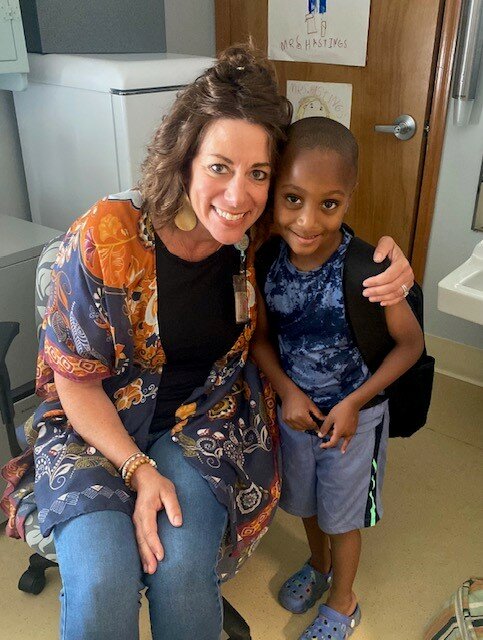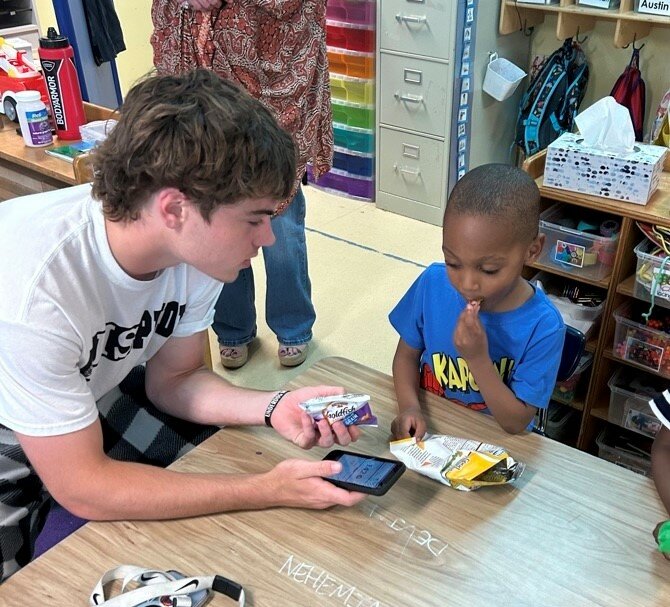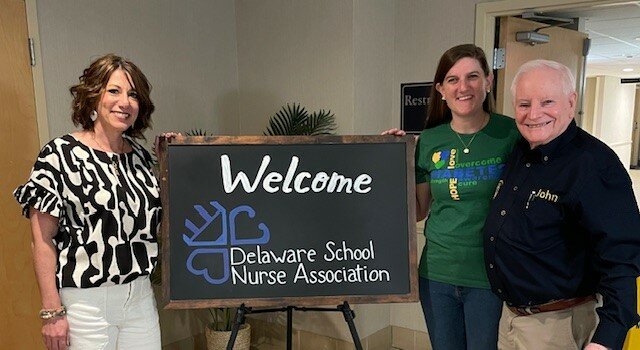Lions Club brings diabetes education to Delaware schools
Students with diabetes have unique challenges when it comes to enduring a long school day — and there are currently more than 300 students living with Type 1 diabetes enrolled in the Delaware …

You must be a member to read this story.
Join our family of readers for as little as $5 per month and support local, unbiased journalism.
Already a member? Log in to continue. Otherwise, follow the link below to join.
Please log in to continueNeed an account?
|
Lions Club brings diabetes education to Delaware schools
 By Mike Finney
By Mike FinneyStudents with diabetes have unique challenges when it comes to enduring a long school day — and there are currently more than 300 students with Type 1 diabetes enrolled in the Delaware school system, according to the documentation system used by Delaware school nurses.
School nurses and staff play an important role in assisting students in the management of diabetes.
Aimee Hastings, a nurse facilitator for the Delaware Diabetes Coalition, went through these experiences first-hand with her son, T.J. He was a student-athlete at Middletown High School when he learned he had Type I diabetes right around his 15th birthday.
She witnessed the daily struggles and thought it would be helpful to provide information to school staff and parents who are undergoing the same kinds of challenges.
That is what sparked Ms. Hastings, a nurse at the Appoquinimink Pre-School Center in Middletown, to try to bring a program to Delaware schools that would invite nurses, teachers, coaches and staff to understand the challenges that students with diabetes face every day.
She reached her goal when a program, “Lions Empowering School Nurses for Children with Diabetes: A Delaware Partnership,” was made available to every school throughout Delaware — both public and private — on March 16 to help answer any questions related to students’ daily struggles with diabetes.
Ms. Hastings first approached John Monahan from the Lions Club District 22 at a meeting with the Delaware Diabetes Coalition.
She shared with Mr. Monahan that she had heard about an e-training program — Salus Education’s “Diabetes Care at School: Bridging the Gap” — for teachers and schools in Virginia that was backed by the Lions Club.
Ms. Hastings and the Delaware Diabetes Coalition then partnered with the Delaware Department of Education and applied for a grant through the Lions Club International Foundation to fund every Delaware school’s access to the training.
Not long after that meeting, the Lions Club International Foundation elected to fund $18,000 for the program over the next two years.
The program provides three levels of diabetes training, which is open to all school nurses, staff, contractors and parents of children living with diabetes. It includes a six-hour certificate-eligible training for school nurses and a 30-minute optional training for non-nursing staff.
Mr. Monahan, whose Lord Baltimore Lions Club represents Ocean View, Dagsboro, Frankford, Millville and Bethany Beach residents, was happy to be a part of bringing the diabetes program to Delaware schools.
“The Lions Clubs of Delaware are thrilled to partner with the Delaware Diabetes Coalition and the Delaware Department of Education to help bring this unique training program to the schools,” said Mr. Monahan, the Lions District 22-D diabetes chair.
“Since diabetes is identified as one of the five world causes of Lions Clubs International, local Lions Clubs and their members will support and promote this initiative and do what we can to improve the lives of those living with diabetes.”
The Lions Club — an international service organization — focuses its efforts on vision, diabetes, youth and childhood cancer, the environment, and education.
Sara Bluhm, executive director of the Delaware Diabetes Coalition, believes the program is a win-win for both school staff and students.
“We’re so excited to partner with the Delaware Lions Clubs District 22-D and the Delaware Department of Education on this breakthrough virtual educational opportunity for all Delaware school nurses, staff and parents,” she said. “To be able to provide such valuable learning content at no cost to the education system, at a time when students are being diagnosed with Type 1 diabetes at a never-before-seen rate, is a lifesaver for those educators who are with these children five days a week.”
Ms. Hastings added that she could not have been more pleased, particularly considering she had dealt with the same issues that many other parents and their families go through when a child receives an unexpected diabetes diagnosis.
“I’m thrilled,” said Ms. Hastings. “I have a son with Type 1 diabetes and I’m a school nurse and I saw how hard it was to keep up with the latest technology and treatment for diabetes in a school setting.
“Already, within a couple of weeks, there were almost 50 school nurses enrolled. Let’s say a child plays sports, then let the coach watch a 20-minute program learning diabetes awareness training. They can help keep the students safe while playing a sport.”
Plus, the number of children living with diabetes continues to rise.
The disease, which used to be referred to as juvenile diabetes, can be developed by people of all ages.
It is a condition where a person’s pancreas produces little to no insulin, which is an important hormone, as it allows the body to turn glucose broken down from carbohydrates into energy.
Type 1 diabetes is thought to be caused by an autoimmune reaction that damages the pancreas.
Having certain genes can make a person more likely to develop the illness, while some environmental factors, like a virus, could also play a role.
Ms. Hastings is especially glad the program is all-encompassing and open to both the school community and parents.
“It takes everyone on board in a school to keep children living with (diabetes) safe,” she said. “It’s important that every person that interacts with a student with it knows the basics of it so there’s no immediate harm and the safety of the child is not at risk — keeping (the students’) blood sugar (level) at a good number. That’s good for short term and long term, so it’s so important that a child’s blood sugar is managed well in a school setting.
“The technology available has made it a lot simpler, but then there’s a learning curve with that. But this program is current and is updated at least yearly, so it does include all the new technology that’s coming out this year.”
Information regarding the “Lions Empowering School Nurses for Children with Diabetes: A Delaware Partnership” program can be found at dediabetescoalition.org under the “Resources” tab.
Staff writer Mike Finney can be reached at 302-741-8230 or mfinney@iniusa.org.
Follow @MikeFinneyDSN on X.
Members and subscribers make this story possible.
You can help support non-partisan, community journalism.
Other items that may interest you








